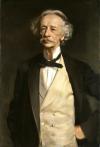Preludes
I The Married Lover
Why, having won her, do I woo?
Because her spirit's vestal grace
Provokes me always to pursue,
But, spirit-like, eludes embrace;
Because her womanhood is such
That, as on court-days subjects kiss
The Queen's hand, yet so near a touch
Affirms no mean familiarness,
Nay, rather marks more fair the height
Which can with safety so neglect
To dread, as lower ladies might,
That grace could meet with disrespect,
Thus she with happy favour feeds
Allegiance from a love so high
That thence no false conceit proceeds
Of difference bridged, or state put by;
Because, although in act and word
As lowly as a wife can be,
Her manners, when they call me lord,
Remind me 'tis by courtesy;
Not with her least consent of will,
Which would my proud affection hurt,
But by the noble style that still
Imputes an unattain'd desert;
Because her gay and lofty brows,
When all is won which hope can ask,
Reflect a light of hopeless snows
That bright in virgin ether bask;
Because, though free of the outer court
I am, this Temple keeps its shrine
Sacred to Heaven; because, in short,
She's not and never can be mine.
II The Amaranth
Feasts satiate; stars distress with height;
Friendship means well, but misses reach,
And wearies in its best delight
Vex'd with the vanities of speech;
Too long regarded, roses even
Afflict the mind with fond unrest;
And to converse direct with Heaven
Is oft a labour in the breast;
Whate'er the up-looking soul admires,
Whate'er the senses' banquet be,
Fatigues at last with vain desires,
Or sickens by satiety;
But truly my delight was more
In her to whom I'm bound for aye
Yesterday than the day before,
And more to-day than yesterday.
Husband And Wife
I
I, while the shop-girl fitted on
The sand-shoes, look'd where, down the bay,
The sea glow'd with a shrouded sun.
I'm ready, Felix; will you pay?
That was my first expense for this
Sweet Stranger, now my three days' Wife.
How light the touches are that kiss
The music from the chords of life!
II
Her feet, by half-a-mile of sea,
In spotless sand left shapely prints;
With agates, then, she loaded me;
(The lapidary call'd them flints);
Then, at her wish, I hail'd a boat,
To take her to the ships-of-war,
At anchor, each a lazy mote
Black in the brilliance, miles from shore.
III
The morning breeze the canvas fill'd,
Lifting us o'er the bright-ridged gulf,
And every lurch my darling thrill'd
With light fear smiling at itself;
And, dashing past the Arrogant,
Asleep upon the restless wave,
After its cruise in the Levant,
We reach'd the Wolf, and signal gave
For help to board: with caution meet,
My bride was placed within the chair,
The red flag wrapp'd about her feet,
And so swung laughing through the air.
IV
Look, Love, she said, there's Frederick Graham,
My cousin, whom you met, you know.
And seeing us, the brave man came,
And made his frank and courteous bow,
And gave my hand a sailor's shake,
And said, You ask'd me to the Hurst:
I never thought my luck would make
Your wife and you my guests the first.
And Honor, cruel, Nor did we:
Have you not lately changed your ship?
Yes: I'm Commander, now, said he,
With a slight quiver of the lip.
We saw the vessel, shown with pride;
Took luncheon; I must eat his salt!
Parting he said, (I fear my bride
Found him unselfish to a fault),
His wish, he saw, had come to pass,
(And so, indeed, her face express'd),
That that should be, whatever 'twas,
Which made his Cousin happiest.
We left him looking from above;
Rich bankrupt! for he could afford
To say most proudly that his love
Was virtue and its own reward.
But others loved as well as he,
(Thought I, half-anger'd), and if fate,
Unfair, had only fashion'd me
As hapless, I had been as great.
V
As souls, ambitious, but low-born,
If raised past hope by luck or wit,
All pride of place will proudly scorn,
And live as they'd been used to it,
So we two wore our strange estate:
Familiar, unaffected, free,
We talk'd, until the dusk grew late,
Of this and that; but, after tea,
As doubtful if a lot so sweet
As ours was ours in very sooth,
Like children, to promote conceit,
We feign'd that it was not the truth;
And she assumed the maiden coy,
And I adored remorseless charms,
And then we clapp'd our hands for joy,
And ran into each other's arms.






